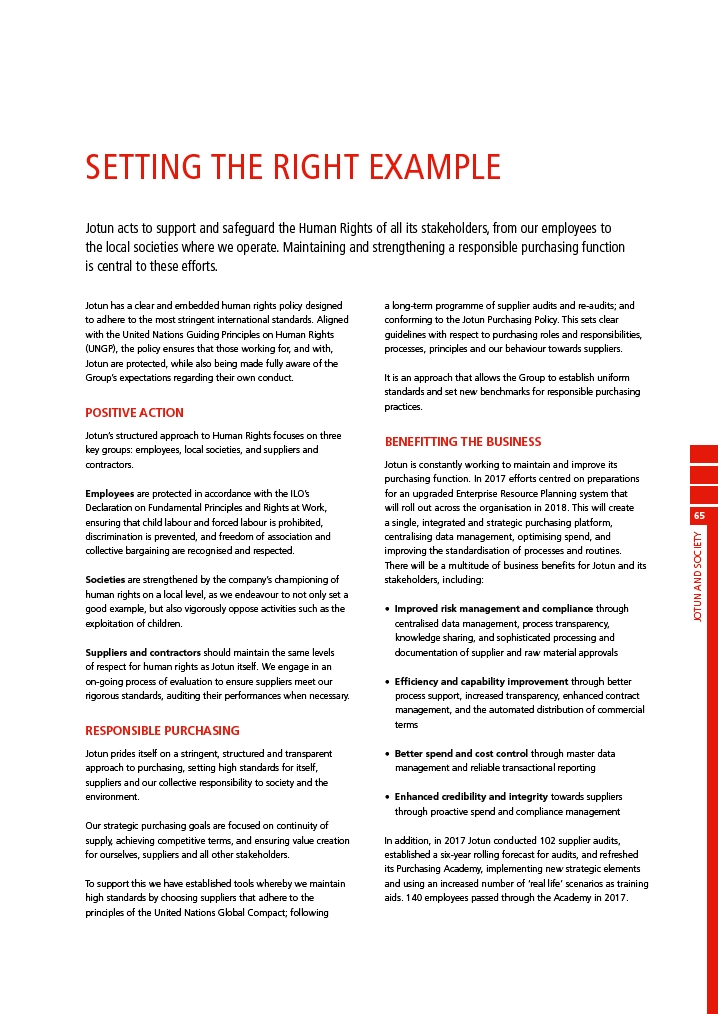
65
JOTUN AND SOCIETY
SETTING THE RIGHT EXAMPLE
Jotun acts to support and safeguard the Human Rights of all its stakeholders, from our employees to
the local societies where we operate. Maintaining and strengthening a responsible purchasing function
is central to these efforts.
Jotun has a clear and embedded human rights policy designed
to adhere to the most stringent international standards. Aligned
with the United Nations Guiding Principles on Human Rights
(UNGP), the policy ensures that those working for, and with,
Jotun are protected, while also being made fully aware of the
Group’s expectations regarding their own conduct.
POSITIVE ACTION
Jotun’s structured approach to Human Rights focuses on three
key groups: employees, local societies, and suppliers and
contractors.
Employees are protected in accordance with the ILO’s
Declaration on Fundamental Principles and Rights at Work,
ensuring that child labour and forced labour is prohibited,
discrimination is prevented, and freedom of association and
collective bargaining are recognised and respected.
Societies are strengthened by the company’s championing of
human rights on a local level, as we endeavour to not only set a
good example, but also vigorously oppose activities such as the
exploitation of children.
Suppliers and contractors should maintain the same levels
of respect for human rights as Jotun itself. We engage in an
on-going process of evaluation to ensure suppliers meet our
rigorous standards, auditing their performances when necessary.
RESPONSIBLE PURCHASING
Jotun prides itself on a stringent, structured and transparent
approach to purchasing, setting high standards for itself,
suppliers and our collective responsibility to society and the
environment.
Our strategic purchasing goals are focused on continuity of
supply, achieving competitive terms, and ensuring value creation
for ourselves, suppliers and all other stakeholders.
To support this we have established tools whereby we maintain
high standards by choosing suppliers that adhere to the
principles of the United Nations Global Compact; following
a long-term programme of supplier audits and re-audits; and
conforming to the Jotun Purchasing Policy. This sets clear
guidelines with respect to purchasing roles and responsibilities,
processes, principles and our behaviour towards suppliers.
It is an approach that allows the Group to establish uniform
standards and set new benchmarks for responsible purchasing
practices.
BENEFITTING THE BUSINESS
Jotun is constantly working to maintain and improve its
purchasing function. In 2017 efforts centred on preparations
for an upgraded Enterprise Resource Planning system that
will roll out across the organisation in 2018. This will create
a single, integrated and strategic purchasing platform,
centralising data management, optimising spend, and
improving the standardisation of processes and routines.
There will be a multitude of business benefits for Jotun and its
stakeholders, including:
• Improved risk management and compliance through
centralised data management, process transparency,
knowledge sharing, and sophisticated processing and
documentation of supplier and raw material approvals
• Efficiency and capability improvement through better
process support, increased transparency, enhanced contract
management, and the automated distribution of commercial
terms
• Better spend and cost control through master data
management and reliable transactional reporting
• Enhanced credibility and integrity towards suppliers
through proactive spend and compliance management
In addition, in 2017 Jotun conducted 102 supplier audits,
established a six-year rolling forecast for audits, and refreshed
its Purchasing Academy, implementing new strategic elements
and using an increased number of ‘real life’ scenarios as training
aids. 140 employees passed through the Academy in 2017.